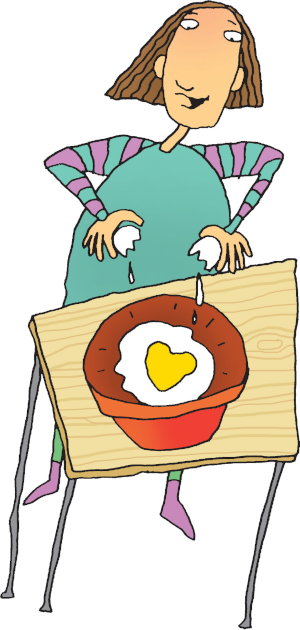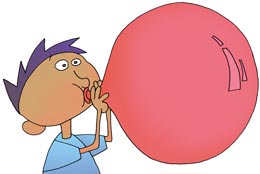Page 466
Understanding Sentences

A sentence is made up of one or more words that express a complete thought. A sentence begins with a capital letter and ends with a period, a question mark, or an exclamation point.
What's Ahead
Parts of a Sentence
Subject
A subject is the part of a sentence that does something.
Marisha baked a chocolate cake.
A subject can also be the word that is talked about.
She is a marvelous cook.
Simple Subject |
A simple subject is the subject without the words that describe or modify it. Marisha’s little sister likes to help. |
Complete Subject |
The complete subject is the simple subject and all the words that describe it. Marisha’s little sister likes to help. (Marisha’s little sister is the complete subject.) |
Compound Subject |
A compound subject has two or more simple subjects. Marisha and her sister frosted the cake. |
Tip Find more information about sentences in “Writing Basic Sentences,” pages 75–80, and in “Combining Sentences,” pages 81–84.
WE 467
Page 467
Predicate
A predicate (verb) is the part of the sentence that says something about the subject.
Marisha baked a cake for my birthday.
(Baked tells what the subject did.)
Simple Predicate |
A simple predicate (verb) is the predicate without the words that modify or complete it. Marisha baked the cake yesterday. |
Complete Predicate |
The complete predicate is the simple predicate with all the words that modify or complete it. Marisha baked the cake yesterday. (The complete predicate is baked the cake yesterday.) |
Compound Predicate |
A compound predicate has two or more simple predicates, or verbs. She decorated it and hid it in the cupboard. |

Modifier
A modifier is a word or a group of words that describes another word.
My family planned a surprise party.
(My modifies family; a and surprise modify party.)
They hid behind the door and waited quietly.
(Behind the door modifies hid; quietly modifies waited.)
Subject-Verb Agreement
The subject and verb of a sentence must “agree” with one another. If you use a singular subject, use a singular verb. If you use a plural subject, use a plural verb. (See page 79.)
Anthony helps Miss Park.
(The singular subject Anthony agrees with the singular verb helps.)
The boys help Miss Park.
(The plural subject boys agrees with the plural verb help.)
WE 468
Page 468
Clauses
A clause is a group of words that has a subject and a predicate. A clause can be independent or dependent.
Independent Clause |
An independent clause expresses a complete thought and can stand alone as a sentence. I ride my bike to school. |
Dependent Clause |
A dependent clause does not express a complete thought and cannot stand alone as a sentence. Dependent clauses usually begin with a subordinating conjunction like when. when the weather is nice Tip Some dependent clauses begin with a relative pronoun like who or that.An independent clause plus a dependent clause form a complex sentence. I ride my bike to school when the weather is nice. |
Phrases
A phrase is a group of words that cannot stand alone as a sentence.
Noun Phrase |
This is a noun phrase. It lacks a predicate. the student |
Verb Phrase |
This is a verb phrase. It lacks a subject. wrote a report |
Prepositional Phrase |
This is a prepositional phrase. (See page 488.) about George Washington |
Appositive Phrase |
This is an appositive phrase. our first president |
Tip When you put these phrases together, they become a sentence.
The student wrote a report about George Washington, our first president.
WE 469
Page 469
Types of Sentences
Simple Sentences |
A simple sentence has only one independent clause (and states only one complete thought). However, it may have a compound subject or a compound predicate and still be a simple sentence. My knees ache. (Simple subject, simple predicate) Cory and I skated for two hours. (Compound subject, simple predicate) My face and neck look red and feel hot. (Compound subject, compound predicate) |
Compound Sentences |
A compound sentence is made up of two or more simple sentences joined by a comma and a coordinating conjunction (and, but, or, nor, for, so, yet), or by a semicolon. (See page 489 for more about coordinating conjunctions.) I’ve skated in Los Angeles, but I have never been to New York. (The conjunction but connects two independent clauses.) Los Angeles is 30 miles from my home; New York is 3,000 miles away. (A semicolon connects two independent clauses.) |
Complex Sentences |
A complex sentence contains one independent clause (in black) and one or more dependent clauses (in red). Dependent clauses begin with a subordinating conjunction like because or a relative pronoun like who or that. Because it was raining, the game was called off. The students, who were wet and cold, got back on the bus. |
WE 470
Page 470
Kinds of Sentences
Statement (Declarative) |
Declarative sentences make statements. They tell something about a person, a place, a thing, or an idea. The capital of Florida is Tallahassee. Lisha swims in the ocean. |
Question (Interrogative) |
Interrogative sentences ask questions. Did you know that Florida’s major industry is tourism? Have you ever gone snorkeling? |
Command (Imperative) |
Imperative sentences give commands. Wait for me. Tip Imperative sentences use an understood subject (you).(You) Never swim alone. (You) Stay here. |
Exclamation (Exclamatory) |
Exclamatory sentences communicate strong emotion or surprise. I just saw a dolphin! Watch out for sharks! |
Sentence Sense
- A sentence is one or more words that express a complete thought.
- A sentence has two basic parts—a subject and a predicate (verb).
- A sentence makes a statement, asks a question, gives a command, or shows strong emotion.
- A sentence begins with a capital letter and ends with a period, a question mark, or an exclamation point.
- More information on sentences is included in “Writing Basic Sentences,” pages 75–80, and in “Combining Sentences,” pages 81–84.